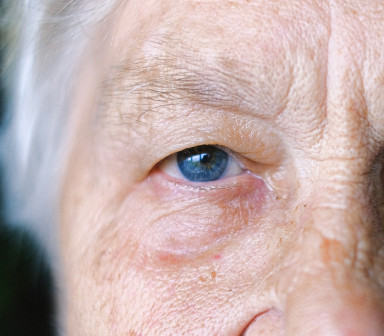In an ageing society, eye health for older people is an important consideration as conditions such as age-related macular degeneration become all the more prevalent.
Though some eye conditions are hereditary, there are things we can do to try and lower the risk of developing some diseases or worsening existing conditions.
Kate White is one of Sight Scotland Veterans' rehabilitation officers. Based at the charity’s Linburn Centre, she works with veterans with sight loss – many of whom are older. Here she gives her top five tips for eye health in older people.

Get a healthy balanced diet and vitamins
We should all be eating a healthy diet regardless of how many candles are on our birthday cake, but small changes to our nutrition intake can delay the onset or even prevent certain eye problems beginning.
Eating leafy green vegetables, fresh fruit and vitamins/minerals (containing omega-3 fatty acids, lutein, B12 and folic acid) and reducing saturated fats and sugar may reduce cardiovascular disease and diabetes risk factors. Following these nutritional changes can also reduce risk factors associated to developing age-related macular degeneration (AMD) (up to 25%) and cataracts.
Wear protective eyewear
The UV rays from the sun has a damaging and ageing impact on our eyes. Strong sunlight can cause an increased risk of developing cataracts and can cause temporary burns to the surface of the eyes. Remember too that reflected sunlight from snow or water (and we have plenty of water in Scotland!) increases the levels of glare which can debilitate how we mobilise and function.
People with fairer skin tones have more risk of developing cataracts (more common in older people) due to the decreased level of melanin. But it’s really easy to protect our eyes with good sunglasses which protect against both UVA and UVB rays and that have a wraparound frame to prevent sunlight leaking in at the sides.
Get your eyes tested
In Scotland getting your eyes tested is free, and for most people a trip to the opticians for a test is only needed every two years. You can read more about getting your eyes tested in Scotland on our information page here.
If you’re already a wear glasses, getting your eyes regularly tested can ensure any changes needed to your lenses mean you get the correct prescription, making it easier to do things like read or watch the TV, as well as stopping thumping headaches.
Even if you don’t wear glasses or feel you don’t have issues with your sight, don’t avoid going for an eye test. Many eye diseases or subtle physiological changes to the eye are detected by opticians long before you will notice them and in time for treatment to take place.
Even if you have been registered with your sight loss you should still get an eye exam to ensure there are not other underlying changes such as increase in interocular pressures which can cause glaucoma. Don’t hesitate to book in with your optician if you ever notice any changes in your vision – however small.
Stop smoking
We’ve all heard of the many ways in which smoking affects your health – and this habit can also increase your risk of developing the eye disease age-related macular degeneration.
One in five AMD-related sight loss cases is linked to smoking. It’s one of the first things us rehabilitation workers will ask the people we work with because we know the impact smoking has on eye health. In order to lower your risk of developing this life-changing condition in later life, we recommend giving up smoking. It’ll save money, too.
Sleep and exercise
Sleep helps lubricate the eyes and remove irritants from the day, giving the eye a spa day. What’s more, having a good circulation system and oxygen intake are beneficial for our health including our eye health. Exercise is the best way to stimulate this. It also boosts endorphins: hormones which make us feel more positive and help us naturally feel tired to get a good night’s sleep. A good, regular sleep routine ensures your eyes give themselves this essential care while you nap.
For older people who may struggle with mobility issues, seated exercises and walking groups can be great ways to improve fitness. We don’t all need to be Olympians to keep healthy! A sight condition also shouldn’t stop you from getting out and about. As a rehabilitation officer, part of my job is carrying out mobility assessments, cane training and route training with veterans with sight loss, enabling them to build confidence, increase their mobility and regain independence out walking in public spaces.
You may also be interested in
Why booking your free eye test matters
Free NHS-funded eye examinations are a straightforward way to look after both your eyes and your general wellbeing and one of the genuine benefits of living in Scotland. Find out more about how to book yours now.
Age-Related Macular Degeneration (AMD): Treatment, Symptoms & Diagnosis
Learn about age-related macular degeneration (AMD), its causes, symptoms, and treatment options in Scotland. Get expert advice and support today.
Glaucoma: Treatment, Symptoms & Diagnosis
Learning more about Glaucoma. Sight Scotland Veterans rehabilitation officer, Katrina, offers expert advice on coping with a glaucoma diagnosis.